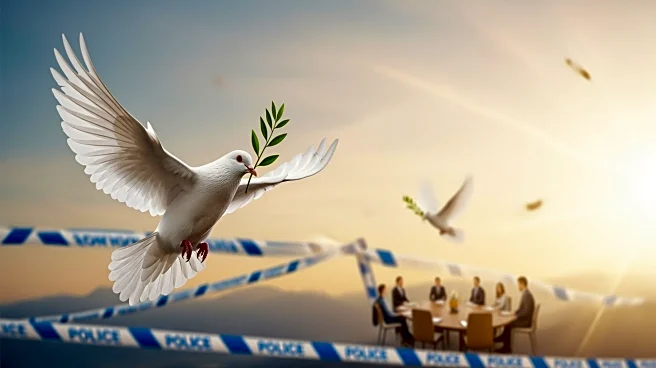What's Happening?
The Red Cross has successfully received and is in the process of transferring the body of a deceased hostage from Gaza to Israeli Defense Forces (IDF) troops. This development follows a confirmation from Hamas
that the transfer had taken place, with spokesman Hazem Qassem stating that efforts to complete the entire exchange process are ongoing. Prior to this, Hamas had released the remains of nine out of 28 deceased hostages held in Gaza. The return of these bodies is a condition of the ceasefire agreement that was implemented last week. However, frustration is mounting in Israel due to delays in the return of the remaining bodies. Israeli intelligence suggests that Hamas may not be able to locate and return all the deceased hostages, although it is believed that Hamas knows the locations of some of the missing bodies.
Why It's Important?
The transfer of the hostage's body is a critical step in the ongoing negotiations and ceasefire agreement between Israel and Hamas. The situation highlights the complexities and challenges in conflict resolution and humanitarian efforts in the region. The delay in returning the bodies has intensified tensions and frustration within Israel, potentially impacting the fragile ceasefire. The successful transfer by the Red Cross underscores the organization's role in mediating humanitarian issues in conflict zones. The broader implications include potential shifts in diplomatic relations and the humanitarian landscape in the region, affecting both local populations and international stakeholders involved in peacekeeping and conflict resolution.
What's Next?
The ongoing efforts to locate and return the remaining bodies are expected to continue, with potential implications for the ceasefire agreement. Israeli authorities may increase pressure on Hamas to fulfill its obligations, while international organizations like the Red Cross may play a more significant role in facilitating these exchanges. The situation remains fluid, and further developments could influence regional stability and international diplomatic efforts. Stakeholders will likely monitor the situation closely, with potential responses from political leaders and humanitarian organizations shaping the next steps in the peace process.









